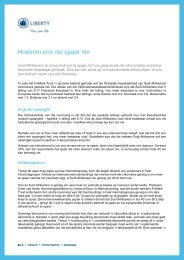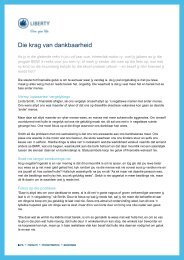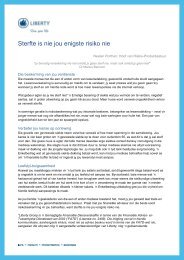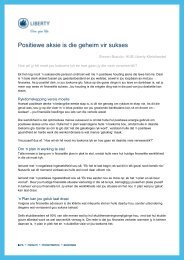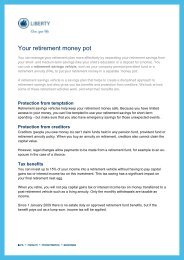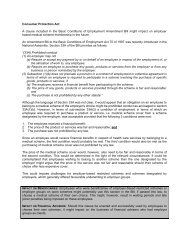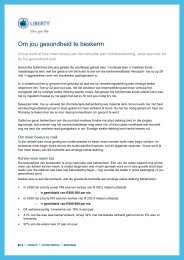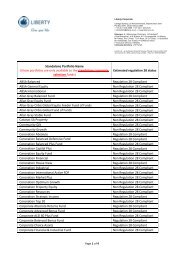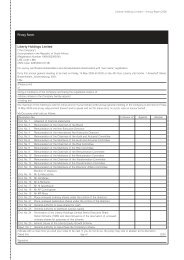You also want an ePaper? Increase the reach of your titles
YUMPU automatically turns print PDFs into web optimized ePapers that Google loves.
<strong>Rising</strong> <strong>oil</strong> <strong>prices</strong> <strong>affect</strong> <strong>economic</strong> <strong>growth</strong>Global <strong>economic</strong> update: May 2011By Kevin Lings and Laura Jones, STANLIB economistsAs the price of <strong>oil</strong> rises above $100 per barrel, concerns increase around the effect thiswill have on global <strong>economic</strong> <strong>growth</strong>.Disruption in the Middle East, the earthquake in Japan and now rising <strong>oil</strong> <strong>prices</strong> are creating instability inrecovering markets.Impact of <strong>oil</strong> price on <strong>economic</strong> <strong>growth</strong>The latest International Monetary Fund (IMF) report concludes that if current <strong>oil</strong> <strong>prices</strong> are sustained ataround $100 a barrel, the impact on the global economy will most likely be relatively modest. Oil <strong>prices</strong> ofover $100 a barrel would begin to hurt the global economy.The increased energy <strong>prices</strong> have so far been smaller than in the past. For the year to date, the price of <strong>oil</strong>has gained 19.25%, with <strong>prices</strong> increasing from $95/barrel to over $113/barrel. According to the IMF, ageneral guideline is that a 10% increase in the price of <strong>oil</strong> reduces global GDP <strong>growth</strong> by between 0.2% and0.3%.If one follows this guideline, then the year-to-date increase in the <strong>oil</strong> price of roughly 20% will result in thedecline of global GDP by between 0.4% and 0.6%. Higher <strong>oil</strong> <strong>prices</strong> will also put upward pressure oninflation.Japan’s rebuild will fuel <strong>oil</strong> <strong>prices</strong>The natural disaster in Japan, the world’s third largest economy, will have an adverse effect on its <strong>economic</strong><strong>growth</strong>, and this may in turn <strong>affect</strong> global <strong>oil</strong> demand. Japan currently imports 4.2 million barrels of <strong>oil</strong> perday but this may pick up dramatically as it works to restoring its economy.The inflation risksEmerging markets are more susceptible to <strong>oil</strong> price increases, and economies such as China and India aremore likely to be <strong>affect</strong>ed than some advanced economies like the US because emerging markets alreadyhave higher inflation rates. Oil price increases will have more of an impact in emerging markets that givemore weighting to energy and food in their inflation baskets.However, this does not mean that advanced economies will not be <strong>affect</strong>ed. Advanced economies such asthe UK are struggling with high inflation rates and weak <strong>economic</strong> <strong>growth</strong> and will most definitely be<strong>affect</strong>ed. This will result in even weaker <strong>economic</strong> <strong>growth</strong>, placing additional upward pressure on inflation.
Consumer spending could slow downIf the <strong>oil</strong> price is sustained at $100-plus, there is a real risk that the current expected pace of global<strong>economic</strong> recovery will slow down.One of the main ways an <strong>oil</strong> supply shock can hurt <strong>growth</strong> is through the effect of energy <strong>prices</strong> on theconsumer. Increased <strong>oil</strong> price spur inflation, which reduces real disposable income and leads to a fall inconsumer spending.If inflation around the world surges and <strong>growth</strong> is dented, the rise in inflation would have a direct andimmediate effect on individuals’ consumption. As consumption generally accounts for 60% of GDP, theoverall effect will be quite dramatic.Fear driving the <strong>oil</strong> priceOil price movements are not only a function of supply and demand but are sometimes also driven by fear.The ‘fear factor’ materialised when political unrest broke out in North Africa and Tunisia and then migratedto the east into the neighbouring countries of Egypt and Libya. This <strong>affect</strong>ed basic supply and demand as <strong>oil</strong>production started to decline.With unrest now moving closer and closer to the world’s biggest <strong>oil</strong> producer, Saudi Arabia, it’s easy tounderstand why markets are feeling uneasy.Liberty Group is an Authorised Financial Services Provider in terms of the FAIS Act (Licence no. 2409). Theinformation contained in this communication, including attachments, is not to be construed as advice interms of the Financial Advisory and Intermediary Services Act of 2002 ("FAIS") as the writer is neither anappointed representative of Liberty, nor a licensed financial services provider as contemplated in FAIS.Please consult your financial adviser should you require advice of a financial nature and/or intermediaryservices.



